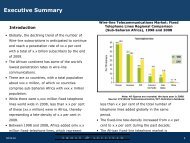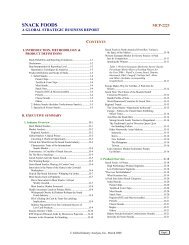the RUSSIA oil & gas competitive intelligence report - Report Buyer
the RUSSIA oil & gas competitive intelligence report - Report Buyer
the RUSSIA oil & gas competitive intelligence report - Report Buyer
You also want an ePaper? Increase the reach of your titles
YUMPU automatically turns print PDFs into web optimized ePapers that Google loves.
Russia Oil and Gas Competitive Intelligence <strong>Report</strong> 2010<br />
The South Stream was originally a 50:50 JV between Gazprom and Eni, but France’s EdF signed an MoU<br />
to take a 10% stake in November 2009. Under <strong>the</strong> agreement, EdF can buy as much as 6bcm per year.<br />
Following <strong>the</strong> finalisation of <strong>the</strong> contracts, <strong>the</strong> partners are hoping to take a FID on <strong>the</strong> project in 2010.<br />
In April 2010, EdF was awarded a larger, 20% stake, in <strong>the</strong> pipeline project. The 20% stake is to be taken<br />
equally from <strong>the</strong> two existing South Stream project partners, Gazprom and Eni. The decision was<br />
announced following discussions between Vladimir Putin and his Italian counterpart Silvio Berlusconi on<br />
April 26, according to a <strong>report</strong> by The Moscow Times. Putin, who declared <strong>the</strong> granting of a 20% stake to<br />
EdF, added that a partnership deal would be signed between EdF, Gazprom and Eni during <strong>the</strong> St.<br />
Petersburg International Economic Forum in June. He also said that following <strong>the</strong> signing of agreements<br />
with <strong>the</strong> Austrian government and <strong>oil</strong> company OMV on April 24, <strong>the</strong>re were now no expectations of<br />
fur<strong>the</strong>r delays to <strong>the</strong> project. Putin confirmed that <strong>the</strong> main terms for <strong>the</strong> admission of EdF to <strong>the</strong> project<br />
had been completed and that South Stream was on course for start-up in H215.<br />
Nord Stream<br />
Russia’s second major export pipeline project is Nord Stream. The 1,200km pipeline is designed to carry<br />
an eventual 55bcm annually under <strong>the</strong> Baltic Sea from Vyborg to Greifswald in Germany. The project is<br />
51% owned by Gazprom along with German partners E.ON Ruhr<strong>gas</strong> and Wintershall, each with 20%,<br />
and later Dutch entrant Gasunie with 9%. In December 2008, French energy group GDF Suez signalled<br />
its intention to participate in Nord Stream as a minority partner. After more than a year of negotiations,<br />
GDF Suez is expected to receive 4.5% each from Nord Stream's two German partners, under a letter of<br />
intent (LoI) signed in March 2010.<br />
Construction of <strong>the</strong> onshore segment began in 2005 and was completed by early-2010, while construction<br />
of <strong>the</strong> underwater segment stalled owing to ongoing environmental concerns, rising costs, technical<br />
obstacles and political objections from neighbouring states. The project, however, made major<br />
breakthroughs in late-2009, securing final approvals from transit states Sweden, Finland and Denmark.<br />
The undersea construction is now set to begin on April 1 2010. At its start-up in 2011, <strong>the</strong> pipeline will<br />
have a capacity of 27.5bcm. The second 27.5bcm phase is planned to come onstream in 2012.<br />
Russia-South Korea Gas Interconnector<br />
South Korea and Russia are expected to begin a new round of talks on a <strong>gas</strong> interconnector between <strong>the</strong><br />
countries, <strong>the</strong> head of foreign projects at Russia's state-run Gazprom, Stanislav Tsygankov, told industry<br />
data provider Platts in April 2010. Two potential <strong>gas</strong> pipeline options between Russia and South Korea<br />
are on <strong>the</strong> table: an overland pipeline via North Korea and a direct undersea pipeline. The first option<br />
suffers from severe geopolitical risks while <strong>the</strong> second option presents formidable technological and<br />
financial challenges. In November 2008, state-run Korea Gas (Ko<strong>gas</strong>) announced its intention to team up<br />
with Gazprom to build an undersea <strong>gas</strong> pipeline from Russia if plans for an overland transit through North<br />
Korea fail. With <strong>the</strong> erratic Pyongyang government under Kim Jong-il announcing periodically that it will<br />
© Business Monitor International Ltd Page 75









